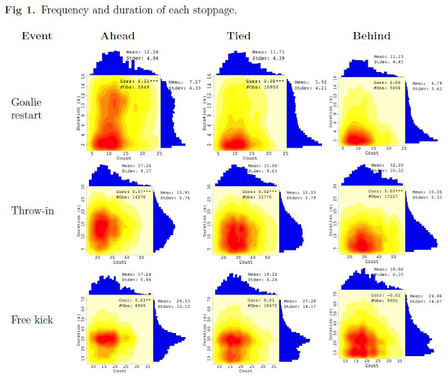 Think about this: football games are divided into two halves of 45 minutes each, and time lost during the regulation time can be added by the referee. What can go wrong? Well, to begin with, research by me, Nils Rudi, and Anup Walvekar published in PLOS ONE found that in one of the elite football leagues, most teams played 50-55 minutes on average per game, so 35-40 minutes of time were lost to game stoppages. The loss of time isn’t fair either. Our research found that when play was stopped, teams that were ahead in the score spent more time restarting the game than teams that tied, and they in turn spent more time than teams that were behind. An advantage meant more time wasting, and this was true for goalies doing kickoffs, goalies kicking or throwing a captured ball, freekicks, throw-ins, corner kicks, and substitutions. See the figure for some examples of the time wasting (the vertical axis shows the time used). To enforce free play, referees are supposed to prevent time-wasting, but from our research findings it is clear that they can’t do this. In fact, we analyzed the time-wasting and found that the teams were able to follow a nearly optimal (for them) time-wasting strategy, which means that that they are effectively sabotaging fair play, and they are also giving football fans fewer minutes of watching their favorite game than the fans would like to have. What can be done? Football is special in many ways. It is the oldest organized team play that is currently big business. It is the largest sport worldwide. Larger revenue than any other, more professional players than any other, probably also more amateur players than any other (they are hard to count). And, it is the most important team sport that has a set game duration and no stopping of the game clock when the play stops. Think about it: the American Football, Ice Hockey, and Basketball stop the clock when the play stops; Baseball and Cricket do not have a clock; only Football and Rugby have a game clock and no clock stopping. If the clock stops whenever play stops, it is impossible to take advantage of game stoppages to waste time and turn a goal advantage early in the game into a win. Most game stoppages would get shorter as a result. Goalie kicks are 80 percent slower under current rules than they would be if the clock is stopped. Goalie restarts are 24 percent slower, and freekicks are 36 percent slower when teams try to waste time. Naturally, the total game time would need to get shorter if the clock is stopped the play stops, but we can calculate how much shorter it should be for the fans to get the same number of actual play minutes. Football is an important game for all its fans, and in fact the main irritation is when play is stopped, and the opposing team is leading and is slow to start the play. How many football fans have booed players from the opposing team who are suspiciously slow to get back up after a tackle, letting seconds tick off the clock while the whole stadium is waiting? If the clock is stopped, everyone would know that the pain is real, and the game is fair. It would be a big change in a traditional game, but maybe it is worth it? Reference Greve, Henrich, Nils Rudi, and Anup Walvekar. Strategic rule breaking: Time wasting to win soccer games. PLOS ONE, 14(12): e0224150. |
Blog's objectiveThis blog is devoted to discussions of how events in the news illustrate organizational research and can be explained by organizational theory. It is only updated when I have time to spare. Archives
May 2024
Categories |
 RSS Feed
RSS Feed